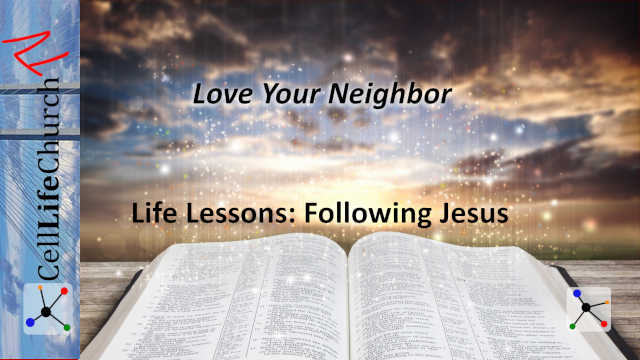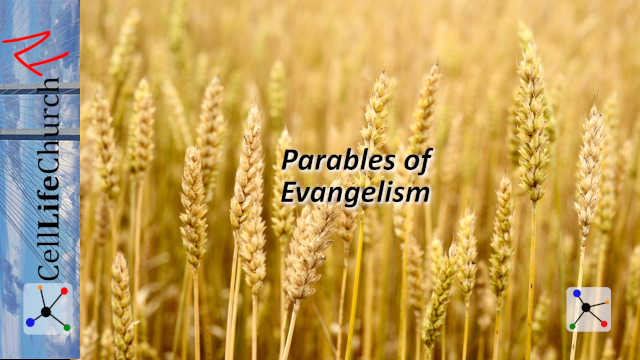In a world divided, Jesus’ call to ‘Love Your Neighbor’ shines bright. Join us as we unpack this timeless truth in our new series, ‘Life Lessons: Following Jesus.’
Estimated reading time: 0 minutes
Table of contents
Downloads and Links
Watch the video of this teaching at https://www.celllifechurch.tv/love-your-neighbor/ or on our YouTube channel.
Introduction
We are starting a new series titled Life Lessons: Following Jesus. We are exploring the timeless teachings of Jesus and their profound relevance in today’s world. In a society marked by uncertainty and rapid change, the teachings and wisdom of Jesus offer a guiding light, illuminating paths of love, forgiveness, and service. Join us as we dig deeper into the heart of Christ’s teachings, discovering practical insights and steps to apply His principles in our everyday lives. Let’s embark on this journey of faith, growth, and transformation as we seek to follow Jesus more closely and live out His teachings in today’s world.
Today we are starting with Jesus’ call to embrace radical love for all people in a world that is often divided. Let’s explore how we can live out this foundational principle of loving our neighbor in our daily lives. The first step in loving our neighbor is understanding neighborly love.
Understanding Neighborly Love
Jesus challenges us to expand our definition of neighbor to encompass all humanity, regardless of differences. Jesus gives us a great parable describing this and it is found in Luke 10:25-37. Let’s read that passage of scripture.
Luke 10:25-37
(25) On one occasion an expert in the law stood up to test Jesus. "Teacher," he asked, "what must I do to inherit eternal life?" (26) "What is written in the Law?" he replied. "How do you read it?" (27) He answered, "'Love the Lord your God with all your heart and with all your soul and with all your strength and with all your mind'; and, 'Love your neighbor as yourself.'" (28) "You have answered correctly," Jesus replied. "Do this and you will live." (29) But he wanted to justify himself, so he asked Jesus, "And who is my neighbor?" (30) In reply Jesus said: "A man was going down from Jerusalem to Jericho, when he was attacked by robbers. They stripped him of his clothes, beat him and went away, leaving him half dead. (31) A priest happened to be going down the same road, and when he saw the man, he passed by on the other side. (32) So too, a Levite, when he came to the place and saw him, passed by on the other side. (33) But a Samaritan, as he traveled, came where the man was; and when he saw him, he took pity on him. (34) He went to him and bandaged his wounds, pouring on oil and wine. Then he put the man on his own donkey, brought him to an inn and took care of him. (35) The next day he took out two denarii and gave them to the innkeeper. 'Look after him,' he said, 'and when I return, I will reimburse you for any extra expense you may have.' (36) "Which of these three do you think was a neighbor to the man who fell into the hands of robbers?" (37) The expert in the law replied, "The one who had mercy on him." Jesus told him, "Go and do likewise."
In this parable, often referred to as The Parable of the Good Samaritan, Jesus illustrates that our neighbor isn’t just the person next door, but anyone in need whom we encounter. The Samaritan’s compassion for the wounded stranger transcended cultural and ethnic boundaries, teaching us to see the humanity in everyone. This is different than the way many people perceive others who appear different or come from a different culture.
Jesus is teaching us that everyone we encounter at work, school, the market, or in the street is our neighbor. When we read Jesus’ teaching about the greatest two commandments found in Matthew 22:37-40 we learn that every other law, prophecy, and doctrine hangs on these two principles. The expert in the law knew this but was trying to find a way out of fully surrendering and being a neighbor to everyone.
To fully comprehend Jesus’ teaching on who our neighbor is and to understand neighborly love, we must learn to practice compassion and empathy to truly be a neighbor of everyone we encounter.
Practicing Compassion and Empathy
We learn from Jesus’ example of compassion towards the marginalized and outcasts, inspiring us to empathize with those in need. A great example of this is found in Matthew 9:35-38. Let’s read that.
Matthew 9:35-38
(35) Jesus went through all the towns and villages, teaching in their synagogues, proclaiming the good news of the kingdom and healing every disease and sickness. (36) When he saw the crowds, he had compassion on them, because they were harassed and helpless, like sheep without a shepherd. (37) Then he said to his disciples, "The harvest is plentiful but the workers are few. (38) Ask the Lord of the harvest, therefore, to send out workers into his harvest field."
“When he saw the crowds, he had compassion for them, because they were harassed and helpless, like sheep without a shepherd.” Jesus’ heart was moved with compassion for the multitudes, demonstrating His deep empathy for those who were suffering and marginalized.
Jesus’ love knows no boundaries or borders. The Samaritan in the parable we read earlier was a foreigner, many of the people Jesus saw were the poor and hungry, and possibly homeless. He saw all that and instead of saying, “They are getting what they deserve” or “What did they expect, they asked for it” he had compassion on them.
We have been called to live like Jesus and we should view the world as Jesus does. We must look at those we encounter every day with compassion and empathy. Do not judge them, love them. Do not pity them, try to understand them and the situation they are in.
Part of practicing compassion and empathy is performing acts of kindness, much like the gentleman who helped the Samaritan in the parable we started with.
Today’s Life Lesson: Acts of Kindness
Today’s life lesson is to actively seek opportunities to serve and uplift others. Live neighborly love, fostering unity and compassion in your communities. Encourage others by doing this openly. Jesus teaches us in Matthew 5:13-16:
Matthew 5:13-16
(13) "You are the salt of the earth. But if the salt loses its saltiness, how can it be made salty again? It is no longer good for anything, except to be thrown out and trampled underfoot. (14) "You are the light of the world. A town built on a hill cannot be hidden. (15) Neither do people light a lamp and put it under a bowl. Instead they put it on its stand, and it gives light to everyone in the house. (16) In the same way, let your light shine before others, that they may see your good deeds and glorify your Father in heaven.
“In the same way, let your light shine before others, so that they may see your good works and give glory to your Father who is in heaven.” Our acts of kindness and service not only reflect the love of Christ but also shine a light in a dark world, pointing others to the source of our compassion and love.
Perform acts of kindness as the Holy Spirit enables you. Live out the tenets that we ascribe to; feeding the hungry, giving water to the thirsty, housing the homeless, clothing the naked, and freeing the captive. Do these things regardless of a person’s faith, position, or wealth. Be the salt of the earth and the light of the world.
There is an old saying, it is easier to catch a fly with honey than vinegar. People are more curious about Jesus and the Kingdom of God after you have openly and honestly served them with no expectation of a return on the favor. There is no guarantee that you will be able to share your faith with them, but the important thing is you were the hands and feet of Jesus to them. You obeyed the prompting of the Holy Spirit, the rest is up to them.
There is no limit to the acts of kindness the Holy Spirit may prompt you to. You may show compassion and empathy to someone for years before they start to soften to the message of the gospel. That’s okay. Continue to be that shining light in your part of the world by performing acts of kindness to everyone the Holy Spirit prompts you to do.
Conclusion
Loving our neighbor is not just a commandment, but a transformative way of life that brings healing and reconciliation to a fractured world. It often brings healing to our own lives as well. Showing love to our neighbor also transforms our perspective and helps us to cast judgment less.
Jesus’ command is simple, love your neighbor as you love yourself. We do this by understanding neighborly love, practicing compassion, and performing acts of kindness. Do not put yourself above anyone else. We learn and live humility as well as forgiveness and mercy as we seek the Kingdom of God.
Next time we will continue Life Lessons: Following Jesus with Grace Unleashed: Liberating Forgiveness.










Leave a comment